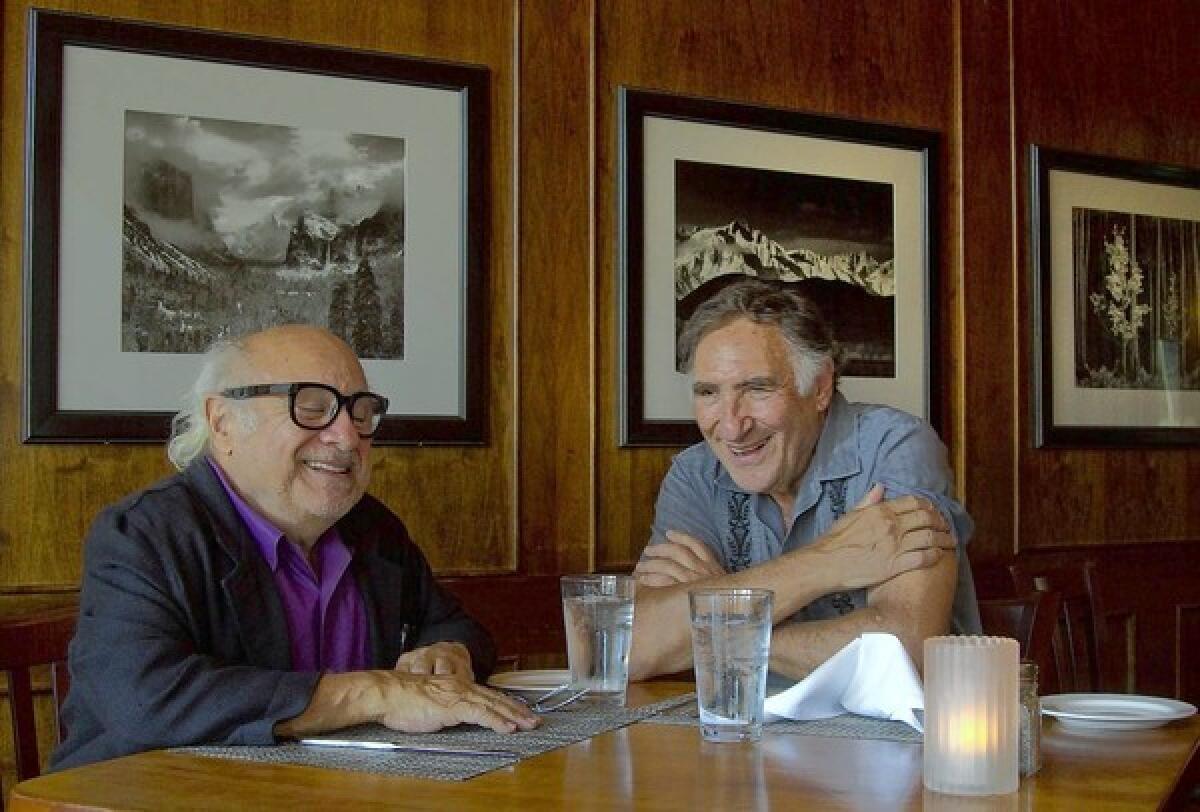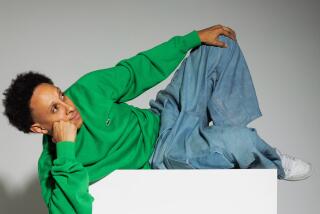Sunshine Boys Danny DeVito and Judd Hirsch crack wise

Danny DeVito and Judd Hirsch blow into a downtown steakhouse like a comedy hurricane.
They’ve arrived straight from rehearsal for their upcoming show, “The Sunshine Boys,” at the Ahmanson Theatre, and the tone of their entrance shtick owes something to the rapid-fire joking favored by the vaudeville comedians they play in the show.
Hirsch is tall and thin with a full head of mussed salt-and-pepper hair. DeVito is short and round and sports a Friar Tuck-like ring of longish white hair. The pair bait each other like a modern-day Laurel and Hardy. No personal space is observed as they fumble around the table, gesticulating wildly and regarding each other with mischievous smirks.
CHEATSHEET: Fall arts preview 2013
“I usually sit on Danny’s lap,” says Hirsch as he misses his seat and almost crashes into DeVito’s shiny bald crown. Then he puts a straw on his head.
“Is that a straw?” DeVito asks, cocking his head and adjusting his thick black-framed glasses on the bridge of his nose.
“I thought it was a look stick,” Hirsch says, squinting at DeVito through one end as if he is peering through a telescope.
Their appearance in Neil Simon’s The Sunshine Boys” isn’t the first time they’ve been onstage together, but it’s been quite awhile — and it happened long before their five-year run on “Taxi” began in 1978.
This revival, directed by Thea Sharrock, began last summer in London where DeVito played Willie Clark opposite the late Richard Griffiths’ Al Lewis at the Savoy.
The show was a critical hit. The Telegraph’s Charles Spencer wrote “Thea Sharrock directs a pitch-perfect production that beautifully captures fleeting moments of tenderness in the comedy without ever turning mushy... This is a golden evening that finds the West End at the top of its game.”
PHOTOS: Hollywood stars on stage
After Griffiths’ death in March, DeVito wasn’t sure if the show could go on for the already announced dates at the Ahmanson. He was over the moon when he reached out to Hirsch and found that he was available.
“I really wanted to do the play, but it had to be with the right person,” DeVito says sipping a glass of Pinot Grigio. “And Judd and I have this wonderful mutual admiration society thing going on.”
Their bond adds a layer of context to “The Sunshine Boys,” which was first produced on Broadway in 1972 and has been adapted multiple times for stage, film and television. (Jack Albertson and Sam Levene were the original Sunshine Boys; Walter Matthau and George Burns starred in the 1975 movie.)
In the play, a popular vaudeville team known as Lewis and Clark is asked to reunite for a television special on the history of comedy, but over the decades that they worked together, they grew to hate each other.
DeVito and Hirsch claim that they’ve never had a fight in real life, but for the play they have found ways of looking like they hate each other. The two say that they are constantly working to surprise each other during rehearsals with unexpected reactions and novel ways of delivering their lines.
PHOTOS: Best in theater for 2012
Up to a point. “If we ever got into the idea of topping each other, it’d be goodbye play,” says Hirsch, emphasizing the importance of the cast’s ensemble work. The play also includes Justin Bartha, Annie Abrams, Matthew Bohrer, Gibby Brand, Johnnie Fiori, Frank Kopyc, Benjamin Burdick and PaSean Wilson.
The two also believe synchronicity is at work in the old friends’ present-day pairing.
“The characters in the play haven’t seen each other in 11 years, and we haven’t worked together in 11 years,” says DeVito as Hirsch pipes in that the cab company on “Taxi,” the ABC sitcom they starred in together from 1978 to ‘83, was called Sunshine Cab Co.
“You get that real rich feeling that our lives are running parallel to what Neil Simon wrote for Willie and Al,” DeVito says.
“Also our characters did an act together for 43 years in ‘The Sunshine Boys’,” says Hirsch. “And Danny and I first met 43 years ago.”
“It’s getting freaky,” says DeVito. “Are you sure we shouldn’t have something stronger than wine?”
That’s what they were drinking back in the days of “Taxi,” when they regularly threw Friday night parties at the studio after wrapping a week’s worth of filming and, as DeVito says, “By the time it was 1 in the morning everyone trickled away. Nobody knew how it ended, and nobody knew how it began.”
PHOTOS: Celebrities by The Times
On “Taxi,” set in a New York City cab company, DeVito played slave-driving dispatcher Louie De Palma and Hirsch played the cynical Alex Reiger — the only character on the show who considers cab driving his actual career. Everyone else thinks they are just stopping through on their way to greater things. The show won 18 Emmys, including three for outstanding comedy series.
“We all got along so well on that show, it was amazing,” DeVito continues. “Here we have the same kind of feeling.”
But they became friends in Philadelphia in 1970 while working on a play called “The Line of Least Existence,” by Rosalyn Drexler. DeVito played a dog and Hirsch played a doctor. DeVito’s canine character was sleeping with Hirsch’s character’s wife, and both men still remember the ribald little ditty that DeVito sang.
“I’m no mutt in a rut because I’ve seen a few things in my day,” sing-songs DeVito, giggling, as Hirsch mouths along. “It’s not smut if some slut wants to throw some affection my way. I’m always at the ready for whatever comes into your head-y if you don’t mind dirt on your beddy, I can take the place of Tom or Eddie.”
PHOTOS: Arts and culture in pictures by The Times
Since then the men have maintained a close friendship even though they aren’t in constant contact. They pick up right where they left off when they see each other, and the past four decades have been salted with reunions, including work on the 1999 Andy Kaufman film biography, “Man on the Moon.” (Kaufman was a cast member on “Taxi.”)
It wasn’t so sunny in Philadelphia when they first met, Hirsch says, invoking the show DeVito currently stars in on FX, because of the war in Vietnam and widespread social upheaval.
DeVito says that he feels a heightened sense of darkness and danger in the world in recent years and that it affects most everything he does.
He chews thoughtfully on a piece of sourdough bread, experiencing a rare somber moment and then brightens and looks at Hirsch.
“We’re going to remedy the joy for the folks that come to our shows. We’re going to make everyone forget everything for a while,” he says, acknowledging the powerful role played by comedy during difficult times, including the two world wars and the Great Depression. “You need a little bit of relief once in a while.”
Hirsch cracks a broad smile and adds, “It’s not going to be like ‘Cabaret,’ though, where you know the Nazis are outside and inside they’re singing, ‘Wilkommen, bienvenue, welcome!’,” he sings this last part in a loud German-accented voice.
Hirsch goes on to say that the relationship of the theater to its audience has changed drastically since the days when “Cabaret” and “The Sunshine Boys” were first performed.
“People just aren’t as sophisticated when it comes to plays anymore,” he says. “And Broadway has become theater for visitors, we sell more tickets to people who come from out of town than to people who live there.”
He looks over at DeVito, who is tapping away on his cellphone, and makes a face as if to say, “Do you see what I mean?”
“You busy?” he asks DeVito.
DeVito looks up with a wry smile and makes a shooing gesture with his right hand.
“I’m like a 14-year-old girl over here,” he says. “You guys go ahead and talk about theater and the difference between the audiences.”
More to Read
The biggest entertainment stories
Get our big stories about Hollywood, film, television, music, arts, culture and more right in your inbox as soon as they publish.
You may occasionally receive promotional content from the Los Angeles Times.











